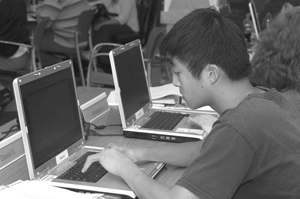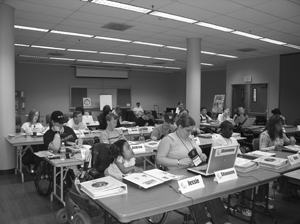Chapter Nine
Use Technology as an Empowering Tool.
Do what you can with what you have, where you are.
— Theodore Roosevelt —

Being technologically competent can provide an avenue to academic and career success. Computer technology is one of the most powerful tools available to individuals with disabilities. Technology, including computers, adaptive technology and the Internet, can help maximize independence, productivity, and participation. It can lead to the highest levels of success—personal, social, academic, and professional. As reported by successful individuals with disabilities:
- The computer helps me organize my thoughts. I can read and make improvements with ease. I can check all of my papers for spelling errors before I send them. I am a really BAD speller. (high school student with a learning disability)
- I use a combination of a palmtop note taker computer and a desktop computer to write. Without them I'd be lost. (college student with mobility/health impairments)
- Without computers or the Net I would not be doing many things that I'm doing today. For instance, I am involved in a writing forum on the Net that lets writers talk about writing and share their pieces of literature with each other. Since I want to be a writer this has been VERY helpful. (high school student with Dyslexia and Attention Deficit Disorder)
- One of my two or three best friends—maybe best next to my wife—and I met on the Internet, and we are not only friends but close working colleagues. (professor who is blind)
And new products are developed every year. As pointed out by a college student who is blind:
- For me I look forward to the future with optimism because I long for the advancements that humanity will make in the fields of technology. Every year more and more technology is developed and marketed that can help make life easier for people with visual impairments.

In the following online activities, young people learn about the roles technology has played in the success of people with disabilities and about how they can use technology to achieve their own success. By the end of this chapter, they will learn how computer technology can help them:
- pursue recreational activities
- make and maintain friendships
- communicate with mentors
- learn and enhance academic performance
- achieve high levels of independence and productivity
- develop skills that will lead to success in employment
- pursue careers in fields that might otherwise be inaccessible
The e-mentoring administrator can select appropriate messages from the following examples and send the Mentor Tip messages to the mentors only and the E-Community Activity messages to the entire online mentoring community. Use these examples to stimulate other ideas for online discussions. It is desirable that, ultimately, most discussion topics come from the mentors and protégés.